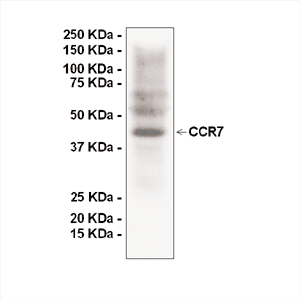Description
BACKGROUND C-C chemokine receptor type 7 (CCR7) is a member of the G protein-coupled receptor family. The receptor is up-regulated in maturing dendritic cells (DCs) and guides the migratory DCs to the lymph nodes upon sensing of “danger signals” (tissue damage, inflammatory cytokines, or pathogens). CCR7 has two ligands, CCL19 and CCL21, which are highly expressed by stromal cells in the T cell-rich lymph node areas.1
CCR7 was described initially as a potent chemotactic receptor expressed by migratory leukocytes, including DCs.2 However, several reports have shown that, apart from chemotaxis, CCR7 can also control additional functions in these cells, such as regulation of protrusions, the rate of endocytosis of the mature DCs, and protecting the cells from apoptosis. Stimulation of CCR7 can also increase the migratory speed of the DCs and enhances mature phenotype of DCs. The latter leads to the secretion of inflammatory cytokines, an increase in the levels of MHC and costimulatory molecules, and the potentiation of the ability of DCs to activate native T cells.
Some of the functions described for CCR7 in DCs have also been observed in other cell types. It has been shown that stimulation of CCR7 induces filopodia formation in mesangial cells and morphological polarization in T cells. Stimulation of CCR7 has also been shown to protect mesangial cells and CD8 T cells from CD95- and etoposide-induced apoptosis, respectively. Moreover, CCR7 regulates the migratory speed of naive T cells and human squamous cell carcinoma. Finally, CCR7 also modulates the differentiation of naive T cell to a Th1 phenotype.3
REFERENCES
1. Gunn, M. D.: Semin. Immunol. 15:271-276, 2003.
2. Sozzani, S. et al: J. Immunol. 161: 1083-1086, 1998.
3. Flanagan, K. et al: Cell Immunol. 231:75-84, 2004.
Products are for research use only. They are not intended for human, animal, or diagnostic applications.
Details
|
Cat.No.:
|
CY1128
|
|
Antigen:
|
Short peptide from human CCR7.
|
|
Isotype:
|
Rabbit IgG
|
|
Species & predicted
species cross-
reactivity ( ):
|
Mouse
|
|
Applications &
Suggested starting
dilutions:*
|
WB 1:500 - 1:10000
IP n/d
IHC n/d
ICC n/d
FACS n/d
|
|
Predicted Molecular
Weight of protein:
|
42 - 45 kDa
|
|
Specificity/Sensitivity:
|
Detects endogenous CCR7 proteins without cross-reactivity with other family members.
|
|
Storage:
|
Store at -20°C, 4°C for frequent use. Avoid repeated freeze-thaw cycles.
|
*Optimal working dilutions must be determined by end user.
Products
| Product | Size | CAT.# | Price | Quantity |
|---|---|---|---|---|
| Rabbit CCR7 Antibody: Rabbit CCR7 Antibody | Size: 100 ul | CAT.#: CY1128 | Price: $384.00 |
Publications
Triana-Baltzer, G.B., L.V. Gubareva, J.M. Nicholls, M.B. Pearce, V.P. Mishin, J.A. Belser, L.-M. Chen, R.W.Y. Chan, M.C.W. Chan, M. Hedlund, J.L. Larson, R.B. Moss, J.M. Katz, T.M. Valentin, J. 2009. MACROPHAGE INVOLVEMENT IN THE REMODELING OF AN EXTRACELLULAR MATRIX SCAFFOLD. PhD Dissertation, U Pittsburgh.

